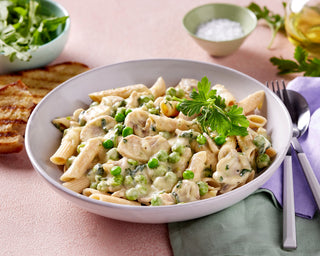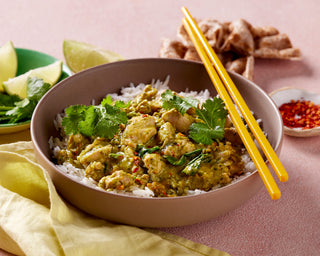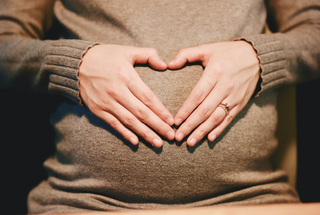
Good nutrition is super important during pregnancy to nourish both mum and bub, and to ensure you have the energy and nutrients to not only grow that demanding little baby, but also to go about living your life!
Read on to find out some of the main things to keep in mind!
Energy
We’ve all heard the old saying “eating for two” about pregnant women, right? Well in fact, this is not actually necessary! A growing foetus only really needs around 350-500 extra calories per day on top of your usual energy requirements. But it’s super boring counting calories all the time, particularly when you’re you know… growing a human… So just think of it as a couple of extra snacks, or an extra meal.
Nutrients
With a balanced diet containing all the food groups, comes a great assortment of nutrients - all of which play a role in keeping you healthy. But when it comes to pregnancy, there are some nutrients that you may need extra of, to help keep you & your baby fighting fit.
Folate
Folate is involved in the metabolism of nucleotides and amino acids; it is therefore essential for DNA synthesis and cell division. During pregnancy, folate is super important to help prevent neural tube defects in the foetus, particularly before falling pregnant and during the first trimester. The Recommended Daily Intake (RDI) of folate for pregnant women overall is 600µg per day, however this is much higher early on.
In the first trimester and prior to becoming pregnant, it is advised to also have an additional 400µg of folic acid per day as a supplement, in order to protect against neural tube defects. This is in large part because it’s difficult to consume 1000µg per day, unless you’re eating lettuce all day like a rabbit! Your pharmacist or doctor will be able to provide you with advice on the best supplement options as everyone has slightly different needs.
Foods to eat that are good sources of folate include green leafy vegetables such as spinach and lettuce, citrus fruits, beans, lentils, eggs, and fortified breads and cereals.
Our fave folate-rich Dineamic meals are Pumpkin and Kale Risotto, Grass Fed Beef Chilli Con Carne, or Broccoli, Spinach and Kale Soup.
Vitamin D:
Vitamin D plays a vital role in enhancing calcium absorption and maintaining bone health, and it occurs in two forms. One form is obtained from sunlight and the other from food, however it’s difficult to obtain enough Vitamin D from food alone and safe exposure to sunlight is important to reach the levels we require.
Many Australians are Vitamin D deficient (particularly in the southern states), and while extra Vitamin D isn’t really required during pregnancy, maternal deficiency does negatively impact the growing foetus. The recommended intake for women is 5µg per day. If you’re experiencing Vitamin D deficiency you may need to take a supplement, as advised by your doctor.
Foods to eat that are good sources of Vitamin D include fatty fish such as tuna, salmon and sardines, cheese, egg yolks, and fortified products.
Our go-to Dineamic meals for some extra Vitamin D include Soy and Ginger Glazed Salmon with Vegetable Fried Rice and our Atlantic Salmon Risotto.
Iron:
Iron is one that we’re sure you’ve heard about again and again, and for good reason! It’s responsible for carrying oxygen within our blood, and iron deficiency can wreak havoc on our bodies and make us feel fatigued. Iron deficiency during pregnancy can also lead to developmental delays for the baby.
The recommended daily intake of iron for women is 18mg per day, however this increases to 27mg per day for pregnant women. If you become iron deficient or anaemic during pregnancy, your doctor may recommend that you take an iron supplement. It’s important to follow your doctor’s advice on this as there is an upper level of intake for iron and if this limit is surpassed it can lead to iron toxicity.
There are two types of iron that we can obtain from food: haem and non-haem. Yes, that is a real word, we didn’t make it up, we promise! Haem iron can be found in animal products, while non-haem iron comes from plant sources. Because non-haem iron is not as easily absorbed, vegetarians and vegans need to ensure that they’re consuming enough additional iron from plant-based sources.

Foods that are good sources of haem iron: Red meat, poultry, and fish.
Foods that are good sources of non-haem (plant-based) iron: Tofu, legumes, green leafy vegetables, rolled oats, almonds, cashews, fortified cereals/breads.
Try Dineamic’s Bircher Muesli with Berries, Minestrone & Quinoa Soup, Moroccan Beef Meatballs with Sweet Pot + Broc, or our Korma Lamb Curry with Rice
Iodine:
Put simply, our bodies need iodine to make thyroid hormones, and for effective bone and brain development during pregnancy.
The RDI for iodine increases in pregnancy from 150µg per day to 220µg, due to the added requirements of the growing baby and their development. Iodine deficiency in a developing foetus can be serious potentially leading to stunted growth and a negative impact on brain development.
Foods to eat that are good sources of iodine include seafood, dairy products, eggs, iodised salt, and fortified breads.
For iodine rich meals, try our Atlantic Salmon Risotto.
Refreshing H2O
We’re sure that you’re all drinking plenty of water each day and don’t need to be told how great it is! The recommendations suggest 2.6L per day for men and 2.1L per day for women, but of course this varies depending on the temperature, your physical activity, and a range of other factors.
Pregnant women do have increased fluid requirements due to expanding extracellular fluid space, the developing foetal needs and the amniotic fluid. But the good news is that this increase is only about 0.2L per day, which is only 1 extra glass. Easy peasy!
As long as you are eating a wide variety of foods from all of the main food groups during pregnancy, nutrient deficiency shouldn’t be a problem. Eat loads of fruit and vegetables in a range of colours and listen to your health care professionals about supplements as needed.
The main thing to remember is simply: Eat the rainbow!
Tell us in the comments what your ultimate pregnancy craving is and what you would like to read about next!




